- Home
- Lin Carter
Thongor at the End of Time Page 3
Thongor at the End of Time Read online
Page 3
But one of the ten was filled with a grim determination to do something, to take some positive action. Charn Thovis had contributed little to the council. He felt unworthy to speak up and to voice his thoughts in the presence of his senior peers. But in his mind was one course of action that could be initiated: one of them must break the seclusion wherein Sumia was kept, even if her privacy was a matter of her own wishes. One must confront her with these and other questions, and make certain that the Sarkaja was not somehow under the power of an enemy.
Charn Thovis resolved to be that man.
Chapter 4: THE FLYING MAN
Thus doom hath struck and Thongor dies.
On substanceless and airy wing
His soul ascends beyond the skies,
Where Death the Conqueror is King.
What of the realm he leaves behind?
What of his lovely, lonely Queen?
Dark traitors subtly sway her mind,
Twixt her and old friends come between.
—Thongor's Saga, Stave XVIII
Night hung like a canopy of black velvet over Patanga. Thick vapors hid the great golden moon of old Lemuria and veiled the host of her attendant stars. The City of the Flame was cloaked in darkness and thick fog rolled in from the gulf to fill her broad stone-paved avenues and squares with dense mists.
Above the royal city, silvery airboats circled tirelessly and keen-eyed officers of the Air Guard kept watch through the long hours of the night. Over the Great Plaza at the city’s heart the floaters drove, above the Temple of the Nineteen Gods and the mighty Thorian Way that stretched from the central square to the West Gate. Over the bazaar and the Hierarchal Palace and above the Palace of Sarks, where it lay amidst the dark shrubbery of the parks and gardens that encircled it.
Neither the guards stationed at gate or tower-top or palace door saw the weird figure that drifted through the black skies toward the palace wherein Sumia dwelt.
A gust of wind arose over the waters and stirred the languid banners of black and gold. For a moment the thick mists that hung above the old stone city were torn asunder and the gold moon peered through them on the slumbering city.
For a moment the flying figure was silhouetted against the bright shield of the moon. Manlike it was, enveloped in what appeared to be vast floating wings. The moment passed; clouds again obscured the night sky. The dark form was again invisible to view.
Silent as a drifting autumn leaf, the flying man came to light upon a balcony of carven marble which obtruded from a tower of the palace far above the fog-drenched gardens. A gloved hand reached for the handle of the long windows. They opened and a dark cloaked figure slid between heavy curtains and vanished within the palace.
The halls of the palace were deserted at this late hour. Only an occasional guard, leaning upon the shaft of his spear, stood at stations here and there throughout the upper stories of the vast structure. But in the private suites reserved for the royal family, guards were few.
The dark figure slunk on silent feet down an immense hall. Superb tapestries of ancient workmanship displayed in somber hues the amours of gods and heroes. Alabaster statues and busts of long-dead monarchs stood enshrined in niches along the corridor. Light blazed from candelabra, twinkling on vases of precious metals. Through empty halls and silent apartments the dark figure crept. A black cloak was drawn about it. A hood concealed the features in shadow.
At the great door of Princess Sumia’s suite, the cloaked figure paused and bent to listen. No sound came from within. No guard was stationed here, for Dalendus Vool wished to make it impossible for any person to have converse or to pass any message to the Sarkaja. Hence the guardposts had been rearranged. Guards stood at the head of each stair which led to the level whereon the royal suites were established. In this way, the Baron of Tallan made it impossible—or so he thought—for any to communicate with the Sarkaja, since to reach her apartments a messenger would have to enter the palace and pass a score of guardposts in his ascent to this high level.
Neither Dalendus Vool nor his dark master had envisioned the possibility of an interloper arriving from the sky.
At the door, Charn Thovis cast his hood back and entered with a key supplied him by the Lady Inneld. Inneld, daughter of Lord Mael, had been Sumia’s handmaiden until her dismissal a few days before. Dalendus Vool had removed all of Sumia’s servants, replacing them with his own staff. But Inneld had retained her private key and on the urgings of Charn Thovis had given it to the young chanthar.
He entered stealthily, knowing that this act could result in his arrest or death. These apartments were forbidden to all on pain of direst punishment. And if the Sarkaja were to raise the alarm he could give no good reason for his secret entry into the palace nor for his unlawful presence in the private suite of the queen and the young prince. However, he felt the risk worth taking.
Hence he had prevailed upon Iothondus for the philosopher’s assistance. The sage of Kathool had recently been experimenting with a new invention—a new use of the magic metal urlium, the weird alloy that resisted the force of gravity and fell up instead of down. This antigravitic metal was the secret which enabled the flying airboats of Patanga to resist the pull of their own weight. The mage had perfected a flying harness covered with plates of the curious glistening metal. This harness, which Iothondus called “the skybelt,” was precisely counterbalanced to the weight of the human body, rendering its wearer perfectly weightless. Wearing the skybelt, a man could float through the air, propelling himself for considerable distances by his muscular strength.
Charn Thovis had found that an ordinary leap could carry him fifty paces into the air, sustaining his weight for a distance of two hundred yards. Wearing the skybelt, then, and cloaked and visored in black against chance notice by any watchful eye, he had hurled himself into empty air from the rooftop of an adjoining mansion . . . and floated like a weightless cloud into the upper works of the palace.
Within the Sarkaja’s suite, he found empty rooms in darkness. Was the queen asleep? Daring much, he made a light. He was in an antechamber adjoining the main suite. Cautiously, he entered the suite and paced silently through the gorgeously appointed rooms. On the threshold of the sleeping chamber he paused, again listening. No sound came to his straining sense. He went in, lifting the candelabra before him. It cast a wavering sphere of illumination over the bedroom. And he saw what he had come to see.
Fully clothed, motionless as an eidolon of polished marble, Sumia Sarkaja sat upright in a great gilded chair. Her eyes were open and stared directly ahead, but did not turn upon Charn Thovis as he entered the room. Her breast rose in slow, shallow breathing, almost imperceptible to the eye. It was that alone told him she still lived.
“My lady!” he gasped, and came to his knees by her side—but she stirred not, neither did she deign to notice him. She continued staring at the empty air as if totally unaware of his presence. He touched her hand where it lay limp and lifeless upon the arm of the chair. It was cool to the touch—like a thing fashioned from pale wax.
“My lady? Do you know me?” he whispered. She made no reply of any kind; her gaze remained fixed on emptiness and did not waver even when he moved his hand before her eyes.
Charn Thovis was puzzled—frightened. He felt a nameless foreboding well up within his heart. Something was wrong here . . . something was terribly wrong! He bent his attention upon her more closely. The warm vivid colors had fled from her face, leaving it pale and serene as a waxen mask. No animation lit her splendid dark eyes that the bards had oft compared to wet glistening black jewels. Her body seemed alive but—untenanted.
Then there came to his nostrils a sickly, overpowering odor. A thick musky sweetness, heady and overripe. The dense perfume made his senses swim.
With a thrill of pure horror he recognized that mind-dulling fragrance. It was the perfume of a potent narcotic called nothlaj, the Flower of Dreams, a drug which submerged the mind of its user in rosy visions, and bent his will to th
e dominance of others. Charn Thovis muffled an expletive as his mind recoiled from this awful discovery. In a flash, the full extent of the secret plot against the crown of Patanga was revealed to him as he stood there astounded and quivering with revulsion.
Some stealthy and cunning traitor had utilized the evil properties of this loathsome narcotic to dull the wits of the Sarkaja and to render her totally subservient. No wonder her actions since the death of Thongor had seemed like the acts of another—no wonder she had dissolved the council of her advisers and withdrew from their surveillance into full privacy! Whatever clever mentality was behind this plot knew full well that the effects of nothlaj could not be easily concealed from the intelligent eye. Only in secret, where she could be commanded to set her signature and seal upon subversive acts and writs and messages, could the traitors manipulate her and hide behind her. In public appearances, her condition would be exposed in an instant. No wonder, then, that Dalendus Vool had dismissed her attendants, replacing them with hand-picked servitors of his own party.
The full extent of this treason smote Charn Thovis as he stood there, staggering under the incredible implications. Whoever was behind this plot—whether Dalendus Yool or another—was now in absolute control of the city and empire of Patanga. Through his total control over the Sarkaja, he could commit any enormity without risk of detection!
A sudden thought struck Charn Thovis as he stood there wondering what to do. The queen was beyond his aid—but what of the young prince, her son? Had Prince Thar eluded the traitor’s cunning hand—or was the boy, too, in the awful power of the devilish nothlaj?
The apartments of the Jasark adjoined those of his mother. Charn Thovis entered them, lifting the candelabra, to see the lad rousing from normal healthy slumber, rubbing his eyes against the light.
“ Charn Thovis!” the boy exclaimed, his eyes widening. “What are you doing here?”
Charn Thovis spoke on sheer impulse, without premeditation. “I’ve come to take you to Lord Mael for a visit.”
The boy’s eyes—so like the strange gold eyes of his father—sparkled with excitement.
“Will I be able to see Lady Inneld and Lady Lulera again?” he asked. “I’ve missed them so much! Will Lord Mael let me ride on a kroter again? They haven’t let me out of the palace for days!”
Charn Thovis’ jaw tightened grimly. “Yes, son, you can ride on a kroter and play with your nurses again,” he said absently. His mind was racing. Above all loomed the question of what to do? As the lad rose and skinned off his nightclothes, strapping a miniature warrior’s harness about his lean and sturdy young body, Charn Thovis stood thinking.
There did not seem to be anything he could do to save the Queen. His flying harness might be able to support the boy’s light weight, but he knew it would not bear up the additional weight of a full-grown woman. Hence he could not rescue both the dragged queen and her son. What, then, should he do? It was an agonizing decision and he had little time to think it out. For all he knew, the queen was so fully under the control of her enemies’ will that to take her from them now might cause her death from the psychic severance. On the other hand, in the person of Prince Thar lay the succession of the throne and the future of the empire. Charn Thovis made his choice with an unspoken prayer that he had chosen wisely.
The boy was almost ready. He tied a scarlet loincloth about his hips and settled his cloak about his shoulders, clipping to the girdle of his harness a small sword given to him by his dead father. Charn Thovis saw in the husky, sturdy nine-year-old, with his coarse black mane and scowling brows and strange gold eyes, the mirror-image of his mighty sire. And tears stung Charn Thovis’ eyes until he shrugged them away.
“I’m ready, Charn Thovis! Shall I say goodbye to Mother?” the lad asked eagerly.
“No, my Prince. Your mother is . . . asleep. Come!” He tossed back his cloak and adjusted the glittering harness. A powered sithurl was set in the chestplate. A touch to its control-nodes would energize the urlium plating, rendering him and the boy nearly weightless. The boy’s eyes sparkled with excitement.
“A skybelt! I’ve heard of those, but my father said I was too young to fly with one. My father said it was too dangerous—”
A lump formed in Charn Thovis’ throat to hear the lad speak of his dead sire. The warrior vowed silently that he would move heaven and earth to shield this precious seed of Thongor’s mighty line from harm. The first step was to waft him from the very stronghold of his enemies, and spirit him away to a secret hiding place among the ten loyalists. Then the banners of revolution could be lifted and the perfidy of Dalendus Vool proclaimed across the land, raising an army of vengeance to support the succession of Prince Thar and unseat the vile usurper that abode now in the seat of stolen power. . . .
“Come, Prince,” he said, scooping the lad up in his arms. Settling the boy upon his back, locking the lad’s arms about his throat and cautioning him to hold on tight, Charn Thovis energized the skybelt and sprang through the window into the dark night.
Friendless and alone, ringed about with their enemies, the loyal warrior and the young prince vanished in the darkness. The hope and the future of Patanga rode on Charn Thovis’ broad shoulders as he launched forth into the empty darkness and flew away into the night.
The Second Book: THONGOR IN THE LAND OF SHADOWS
“Know, O mortal, that beyond these Lands of the Living there lieth that far and mysterious realm wherein the shadows dwell. Strange and awesome beyond belief are the marvels and mysteries of the Shadowlands, wherein naught is what it seems and thy lonely spirit wanders for eternity amidst the symbols and cryptic analogues of this life ere yet thou dost venture on into the next. Here the very Gods move among the shades of men and thou standest in the stupendous Presence before whom art thou judged for all time to come. . .”
—The Scarlet Edda
Chapter 5: THE DWELLER ON THE THRESHOLD
The Shadow-Gates before him loom,
Grim gateways of eternal stone
Beyond the shadows of the tomb,
Strange portals to a land unknown . . .
—Thongor’s Saga, Stave XVIII
After an immeasurable gulf of time, Thongor found himself standing before the towering arch of some stupendous gate. All about him beat great winds and his ears rang with distant wailing voices whose words he could not make out. He stared up at the soaring pylons of the gate and strove to comprehend what had happened to him. All he remembered was a searing thrust of pain against his heart—then naught but an abyss of whirling dark and howling gales and biting cold that cut to the marrow. Then . . . nothingness . . . until he regained his senses to find himself standing in the very shadow of this titanic gate.
It was hewn from some bright metal or glistening stone, and it shimmered in his gaze with such supernal brilliance that he could not fully focus his vision upon it. The arch seemed taller than the tallest tower of his city of Patanga, and its surfaces were sculpted all over with seething multitudes of human figures. There were weeping women and battling youths, and old men stretched out upon their beds as if at the moment of death, with veiled figures about them, and youths and maidens playing, crowned kings and tattered beggars, corpulent lords at feast and sly, grinning thieves, crones and babes and all forms of mortality.
“Thou dost gaze upon the Gate between the Worlds, O Man!”
The voice was deep and sonorous and of unearthly resonance, such as sounded never from a human breast. He started and half-turned, one hand darting to his hip where it should have clasped the hard pommel of a great Valkarthan broadsword, but instead it brushed bare flesh. And looking down he was astonished to find that he was naked as on the day of his birth.
“Who speaks?” he demanded, and the sound of his voice over the wind sounded strange in his ears, as if it was not his voice at all.
I, who dwell here from one eternity unto the next, upon the threshold of this realm whereunto thou hast come at last, as all men come in the fullness of
time.”
Peering closer, Thongor saw that within the arch of the gigantic gate sat a strange figure. Seated, it still was taller than ever was mortal man. From head to foot, the titanic figure was veiled in some dark stuff that was not cloth, at least not any cloth he knew. It was as if darkness itself clothed the curious figure of the Dweller on the Threshold.
Fighting against the raging gale, Thongor strode nearer until he came to stand before the veiled one. Wrathful fires stirred in his lion-bright eyes and anger, mixed with awe and a dim shadow of fear, rose within his breast.
“What is this place,” he growled, “and how have I come here—and who or what are you who hold this gate?”
The figure robed and hooded in shadows shook its mighty head ponderously, and there was a hint of mockery in its deep, solemn voice as it spoke again.
“Questions and yet more questions, yet always the same questions!” the voice mocked him gently. “O Man, look behind thee and tell me what thou seest.”
Thongor turned to look behind—and felt his reason reel! Behind him the world fell away like a mighty cliff . . . aye, the great-grandfather of all cliffs, for so deeply did the walls fall away that the bottom thereof was thick and black with shadows . . . shadows wherein he was weirdly shaken to see stars glitter! Stars blazed far at the uttermost bottom of the vast abyss!
He lifted his dazed and uncomprehending eyes and stared across the dim and mystic gulf. On the other side— the gods alone knew how far away!—he glimpsed a tableland, a plateau or level land so vast that his gaze could encompass whole oceans in their entirety upon it, aye, and the enormous width of continents unknown to him. And amongst them, he dimly glimpsed the familiar outlines of that mighty Lemuria he had left. He could see the dull, glistening wedge of the gulf cutting deep into the center of the continent, but from this enormous height and colossal distance the great city of Patanga itself was only the tiniest of flecks, invisible to his eyes that blurred and watered against the screaming wings of the storm.

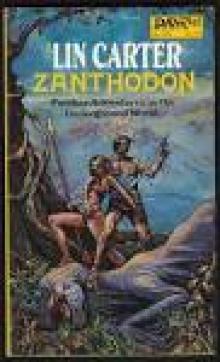 Zanthodon
Zanthodon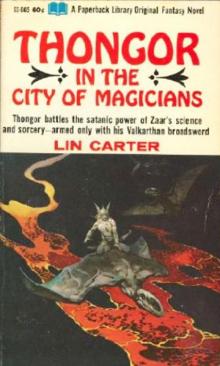 Thongor in the City of Magicians
Thongor in the City of Magicians Thongor at the End of Time
Thongor at the End of Time The Valley Where Time Stood Still
The Valley Where Time Stood Still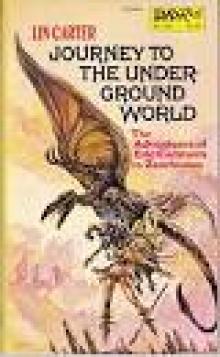 Journey To The Underground World
Journey To The Underground World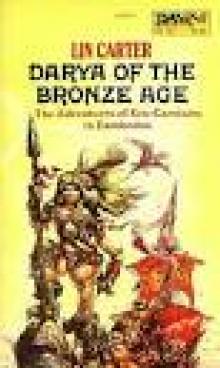 Darya of The Bronze Age
Darya of The Bronze Age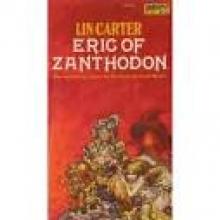 Eric of Zanthodon
Eric of Zanthodon Hurok Of The Stone Age
Hurok Of The Stone Age Tower Of The Medusa
Tower Of The Medusa Thongor Fights the Pirates of Tarakus
Thongor Fights the Pirates of Tarakus The Zanthodon MEGAPACK ™: The Complete 5-Book Series
The Zanthodon MEGAPACK ™: The Complete 5-Book Series The Quest of Kadji
The Quest of Kadji Lin Carter - The Man Who Loved Mars
Lin Carter - The Man Who Loved Mars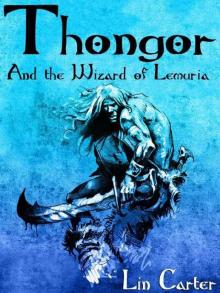 Thongor and the Wizard of Lemuria
Thongor and the Wizard of Lemuria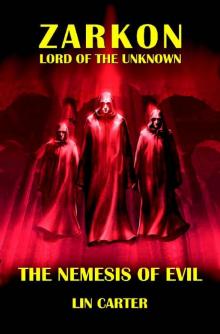 The Nemesis of Evil
The Nemesis of Evil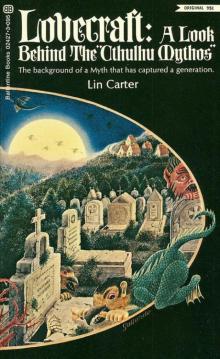 H.P.Lovecraft: A Look Behind Cthulhu Mythos
H.P.Lovecraft: A Look Behind Cthulhu Mythos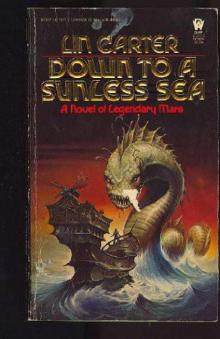 Lin Carter - Down to a Sunless Sea
Lin Carter - Down to a Sunless Sea Horror Wears Blue
Horror Wears Blue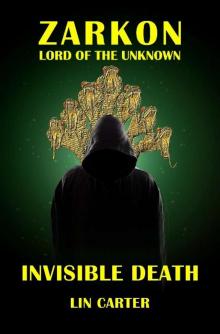 Invisible Death
Invisible Death Lin Carter - The City Outside the World
Lin Carter - The City Outside the World The Volcano Ogre
The Volcano Ogre The Man Who Loved Mars
The Man Who Loved Mars